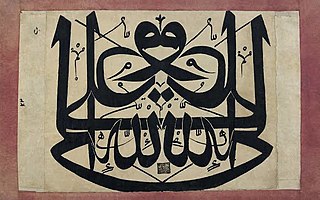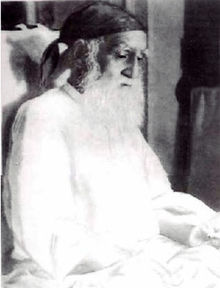
Sufism, also known as Tasawwuf, is a mystic body of religious practice found within Islam which is characterized by a focus on Islamic purification, spirituality, ritualism, asceticism and esotericism. It has been variously defined as "Islamic mysticism", "the mystical expression of Islamic faith", "the inward dimension of Islam", "the phenomenon of mysticism within Islam", the "main manifestation and the most important and central crystallization" of mystical practice in Islam, and "the interiorization and intensification of Islamic faith and practice".

A tariqa is a school or order of Sufism, or specifically a concept for the mystical teaching and spiritual practices of such an order with the aim of seeking haqiqa, which translates as "ultimate truth".

The Chishtī Order is a tariqa, an order or school within the mystic Sufi tradition of Sunni Islam. The Chishti Order is known for its emphasis on love, tolerance, and openness. It began with Abu Ishaq Shami in Chisht, circa 930 AD in a small town near Herat, a strategic city in then Eastern Persia, which later became independent and then part of Afghanistan.

Chishtī Muʿīn al-Dīn Ḥasan Sijzī, known more commonly as Muʿīn al-Dīn Chishtī or Moinuddin Chishti, or by the epithet Gharib Nawaz, or reverently as a Shaykh Muʿīn al-Dīn or Muʿīn al-Dīn or Khwāja Muʿīn al-Dīn by Muslims of the Indian subcontinent, was a Persian Sunni Muslim preacher and Sayyid, ascetic, religious scholar, philosopher and mystic from Sistan, who eventually ended up settling in the Indian subcontinent in the early 13th-century, where he promulgated the famous Chishtiyya order of Sunni mysticism. This particular tariqa (order) became the dominant Muslim spiritual group in medieval India and many of the most beloved and venerated Indian Sunni saints were Chishti in their affiliation, including Nizamuddin Awliya and Amir Khusrow.

Sultan Bahu, was a 17th-century Punjabi Sufi mystic, poet, scholar and historian. He was active in the Punjab region during the reigns of Mughal emperors Shah Jahan and Aurangzeb.

The Shadhili Order is a tariqah or Sufi order of Sunni Islam founded by al-Shadhili in the 13th century and is followed by millions of people around the world. Many followers of the Shadhili Order are known as Shadhilis, and a single follower is known as Shadhili.

The Qadiriyya are members of the Sunni Qadiri tariqa. The tariqa got its name from Abdul Qadir Gilani, who was a Hanbali scholar from Gilan, Iran. The order relies strongly upon adherence to the fundamentals of Sunni Islamic law.

Sufism is the mystical branch of Islam in which Muslims seek divine love and truth through direct personal experience of God. This mystic tradition within Islam developed in several stages of growth, emerging first in the form of early asceticism, based on the teachings of Hasan al-Basri, before entering the second stage of more classical mysticism of divine love, as promoted by al-Ghazali and Attar of Nishapur, and finally emerging in the institutionalized form of today's network of fraternal Sufi orders, based on Sufis such as Rumi and Yunus Emre. At its core, however, Sufism remains an individual mystic experience, and a Sufi can be characterized as one who seeks the annihilation of the ego in God.

ʿAbdul Qādir Gīlānī, known by admirers as Muḥyī l-Dīn Abū Muḥammad b. Abū Sāliḥ ʿAbd al-Qādir al-Jīlānī al-Baḡdādī al-Ḥasanī al-Ḥusaynī, was a Sunni Muslim preacher, ascetic, mystic, jurist, and theologian belonging to the Hanbali, and the eponymous founder of the Qadiriyya tariqa of Sufism. The Qadiriyya tariqa is named after him.

Maudood Chishti was an early day Sufi Saint, a successor to his father and master Abu Yusuf Bin Saamaan, twelfth link in the Sufi silsilah of Chishti Order, and the Master of Shareef Zandani. He was born around 430 Hijri in the city of Chisht. He initially received education from his father. He memorized the Qur'an by age 7 and completed his education when he was 16. His work includes two books, Minhaaj ul Arifeen and Khulaasat ul Shariah. He died in the month of Rajab at the age of 97 in 533 AH. He was buried at Chisht like many of the early Chishtiyya.

Pir Syed Meher Ali Shah Hanfi Qadri Chisti ؓ, was a Sufi, a great scholar and a mystic Punjabi poet from Punjab, British India belonging to the Chishti order. He is known as a Hanafi scholar who led the anti-Ahmadiyya movement. He wrote several books, most notably Saif e Chishtiyai, a polemical work criticizing the Ahmadiyya movement of Mirza Ghulam Ahmad.
The Sufi Ruhaniat International (SRI) is a stream of Universal Sufism and draws inspiration from traditions of Sufism within and beyond historic Islam. SRI is an initiatic order within the lineage of Inayat Khan (Inayati-Chishtiyya). Sufi Ahmed Murad Chisti, a disciple of Inayat Khan, formally founded the order in 1970. There are centers throughout the United States, Belgium, Canada, the Netherlands and the United Kingdom.
Muhammad bin Muhammad al-Fassi (1760?–1863) was the originator of the Fassi family of Sheikhs who constitute the Fassiyatush Shadhiliyya Sufi order.

Ibrahim bin Abdul-Aziz Abul-Majdi, better known as Shaykh al-Islam Ibrahim al-Desouki, was an Egyptian Imam and the founder of the Desouki Order, (also known as the Burhaniyyah tariqa.

ʿAbd al-Razzāq b. ʿAbd al-Qādir al-Jīlānī, also known as Abū Bakr al-Jīlī or ʿAbd al-Razzāq al-Jīlānī for short, or reverentially as Shaykh ʿAbd al-Razzāq al-Jīlānī by Sunni Muslims, was a Persian Sunni Muslim Hanbali theologian, jurist, traditionalist and Sufi mystic based in Baghdad. He received his initial training in the traditional Islamic sciences from his father, Abdul-Qadir Gilani, the founder of the Qadiriyya order of Sunni mysticism, prior to setting out "on his own to attend the lectures of other prominent Hanbali scholars" in his region. He is sometimes given the Arabic honorary epithet Tāj al-Dīn in Sunni tradition, due to his reputation as a mystic of the Hanbali school.